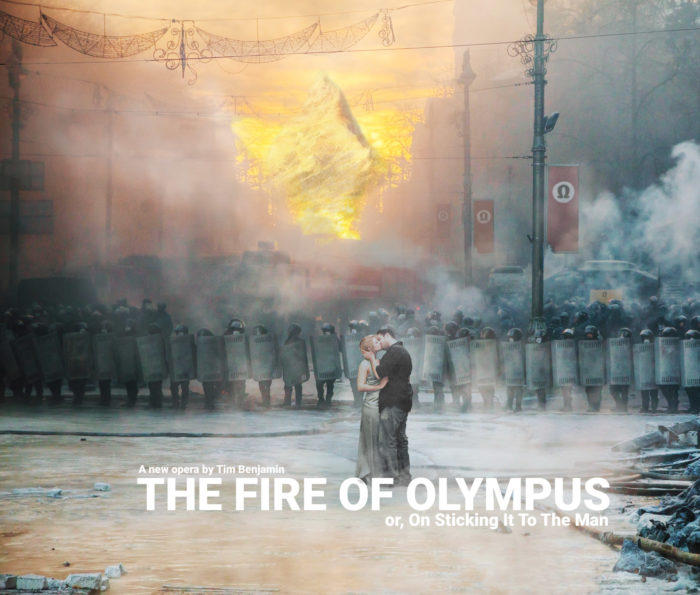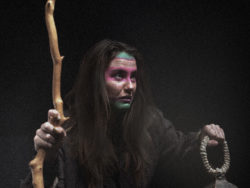The Fire of Olympus - performance review

Tim Benjamin's brilliant new opera was premiered by Radius Opera at Burnley Mechanics on Saturday 14th September. Like Tim’s 2017 work, the oratorio Herakles, this was inspired by classical mythology, but this time offering a twenty-first-century take on the story of Prometheus and Pandora.
The set was minimalist but effective in establishing the stark, authoritarian world of Olympus, the column-like banners and plinths evoking a classical temple. The action often involved a division between the left and right sides of the stage, the distinction subtly made by contrasting lighting.

An elderly Prometheus begins and ends the story: © Radius Opera.
Costumes, too, were simple but provided an easy-to-read shorthand for each character: Prometheus and Epimetheus wore the scruffy attire of activists, the latter’s more colourful clothing signalling his younger, rasher approach to life; Zeus donned a silk smoking-jacket before addressing the people, the image of elitist arrogance; Hephaestus’ jack-boots and military-style coat suggested a merciless head-of-security; Pandora’s elegant white suit was apt for her role as Zeus’ assistant, but also signalled her innocent beauty, forced by Zeus to undertake the honey-trap role from which she would rebel.

Epimetheus the joker encounters Pandora: © Radius Opera.
The young professional singers who made up the cast were uniformly excellent. Their strong voices and clear enunciation allowed every word to be heard, while their skill as actors meant that the narrative was clearly conveyed. They were accompanied by a ten-piece band, directed by Ellie Slorach, effectively a small Baroque orchestra, with harpsichord, strings and oboe, as demanded by the style of music. An audience member was overheard to comment ‘It’s like hearing a whole new Handel opera!’ – and indeed, the piece was Handelian in structure, with the action largely carried forward by recitative, supported by continuo, alternating with more reflective arias and duets.

The mysterious Fire: © Radius Opera.
The Handelian aspects of style, however, were interwoven with more modern elements. This was especially apparent in one of the most striking aspects of the piece, its innovative use of a surround-sound digital ‘Chorus of Thousand(s)’. Created out of recordings from workshops held earlier in the year with amateur choirs and choral societies across the North and Midlands of England, this represented ‘The People’ over whom Zeus exercises his autocratic rule. The crowd could be noisy in approbation or condemnation, and supplied sound-effects e.g. for the controlling power of Hephaestus (Michael Jones) over the imprisoned Prometheus.
Highlights for me were an early bass aria by Zeus (Robert Garland), 'A crisis, an opportunity', the expansive Handelian style perfectly matching his smugly self-satisfied political machinations. Highly dramatic cries of ‘Revolution!’ by Epimetheus (Elspeth Marrow) contrasted with soulful lament by the imprisoned Prometheus (Sophie Dicks), the two mezzos later combining in a moving duet, echoed in the accompaniment by two violins. Just before the interval, a particularly evocative tune emerged from the invisible chorus, sung by a single male voice (Terry Halstead, veteran of Todmorden Choral Society), gradually joined by the voices of children. In the second half, a soaring soprano aria was particularly effective in expressing Pandora’s (Charlotte Hoather) revolt against Zeus, the drama building to the climax of Prometheus’ release of the Fire.

The band, directed by Ellie Slorach, rehearse with bass Robert Garland: © Radius Opera.
Further live performances in the north of England are to be followed by a film version, premiering at Leeds University's Clothworker's Hall on November 16th.
Emma Stafford
Hercules Project Coordinator
